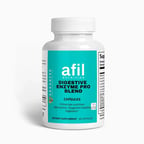Streptococcus Faecium
Streptococcus faecium is a common probiotic, but some may react to it due to gut imbalance, histamine, or immune sensitivity. Alternatives and symptom tracking can help manage it.
🦠 What is Streptococcus Faecium?
Streptococcus faecium (Enterococcus faecium) is a gut-friendly probiotic that supports digestion and immunity but may cause issues in people with weak immune systems.
🤔 Why Do I Have a Deficiency in Streptococcus Faecium?
A deficiency in S. faecium can result from various factors:
-
Low intake of fermented foods – These bacteria are often found in fermented dairy and probiotic-rich foods.
-
Antibiotic use – Antibiotics can wipe out both harmful and beneficial bacteria, including Streptococcus faecium.
-
Gut imbalance – Dysbiosis or poor microbiome diversity may prevent this strain from thriving.
-
Weak colonization – Some probiotic strains don’t colonize well in all individuals, leading to lower levels despite exposure.
-
Immune system disruption – Immune issues can affect the survival or balance of certain gut bacteria.
🛠️ What Can I Do About It?
-
🥛 Eat Fermented Foods – Include yogurt, kefir, and fermented dairy that naturally contain Streptococcus faecium.
-
💊 Use Targeted Probiotics – Choose supplements that list Streptococcus (Enterococcus) faecium as an ingredient.
-
🌱 Support with Prebiotics – Eat fiber-rich foods like garlic, onions, and oats to feed beneficial bacteria.
-
🧘 Reduce Stress – Chronic stress can disrupt your microbiome and reduce healthy bacteria.
-
🍽️ Maintain a Gut-Friendly Diet – Focus on whole, unprocessed foods that support overall microbiome health.
💊 Which Supplements Can Help with an S. Faecium Deficiency?
- Lactobacillus strains + digestive enzymes – Gentle probiotics that support digestive health.

- Bifidobacterium probiotics + prebiotics – Help balance gut flora without introducing S. faecium.

- Magnesium – Helps regulate digestion and reduce inflammation.

🌟 Why Might I Have a Deficiency in Streptococcus Faecium but Not Other Probiotics?
-
Limited food sources – It's less common in fermented foods compared to other strains like Lactobacillus.
-
Poor colonization – Streptococcus faecium may not colonize as easily or permanently in some people’s guts.
-
Strain-specific sensitivity – Your body may naturally support other strains better due to genetics or gut environment.
-
Antibiotic resistance patterns – While some probiotics survive antibiotics, Streptococcus faecium might be more affected depending on the medication used.
-
Immunity interactions – The immune system may selectively suppress certain strains, especially ones that can become opportunistic.
🍽️ Foods to Avoid with a Streptococcus Faecium Deficiency
-
Highly processed foods – Can disrupt gut balance and reduce beneficial bacteria.
-
High-sugar items – Sugar feeds harmful microbes that crowd out good strains.
-
Non-organic meats – May contain antibiotic residues that harm gut flora.
-
Low-fiber diets – Lack of fiber can starve beneficial bacteria like S. faecium.
-
Excess alcohol – Can damage the gut lining and alter microbiome balance.
🍽️ Foods that Support a Streptococcus Faecium Deficiency
-
Yogurt and kefir – Especially those with live cultures and multiple probiotic strains
-
Fermented vegetables – Sauerkraut, kimchi, and pickles with live bacteria
-
Prebiotic-rich foods – Garlic, onions, leeks, bananas, and asparagus feed good bacteria
-
Whole grains – Oats, barley, and brown rice support gut diversity
-
Legumes – Lentils and beans provide fiber and nutrients for beneficial bacteria
.png?width=100&height=75&name=AFIL%20Logo%20(1).png)